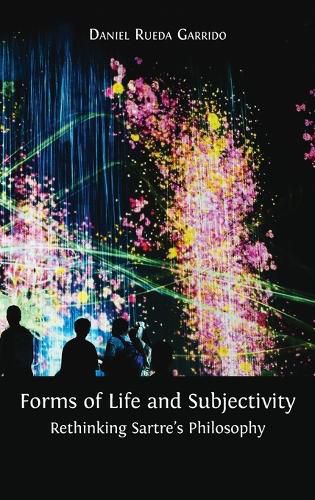Readings Newsletter
Become a Readings Member to make your shopping experience even easier.
Sign in or sign up for free!
You’re not far away from qualifying for FREE standard shipping within Australia
You’ve qualified for FREE standard shipping within Australia
The cart is loading…






This title is printed to order. This book may have been self-published. If so, we cannot guarantee the quality of the content. In the main most books will have gone through the editing process however some may not. We therefore suggest that you be aware of this before ordering this book. If in doubt check either the author or publisher’s details as we are unable to accept any returns unless they are faulty. Please contact us if you have any questions.
Forms of Life and Subjectivity: Rethinking Sartre’s Philosophy explores the fundamental question of why we act as we do. Informed by an ontological and phenomenological approach, and building mainly, but not exclusively, on the thought of Sartre, Daniel Rueda Garrido considers the concept of a form of life as a term that bridges the gap between subjective identity and communities.
This first systematic ontology of forms of life seeks to understand why we act in certain ways, and why we cling to certain identities, such as nationalisms, social movements, cultural minorities, racism, or religion. The answer, as Rueda Garrido argues, depends on an understanding of ourselves as forms of life that remains sensitive to the relationship between ontology and power, between what we want to be and what we ought to be.
Structured in seven chapters, Rueda Garrido’s investigation yields illuminating and timely discussions of conversion, the constitution of subjectivity as an intersubjective self, the distinction between imitation and reproduction, the relationship between freedom and facticity, and the dialectical process by which two particular ways of being and acting enter into a situation of assimilation-resistance, as exemplified by capitalist and artistic forms of life.
This ambitious and original work will be of great interest to scholars and students of philosophy, social sciences, cultural studies, psychology and anthropology. Its wide-ranging reflection on the human being and society will also appeal to the general reader of philosophy.
$9.00 standard shipping within Australia
FREE standard shipping within Australia for orders over $100.00
Express & International shipping calculated at checkout
This title is printed to order. This book may have been self-published. If so, we cannot guarantee the quality of the content. In the main most books will have gone through the editing process however some may not. We therefore suggest that you be aware of this before ordering this book. If in doubt check either the author or publisher’s details as we are unable to accept any returns unless they are faulty. Please contact us if you have any questions.
Forms of Life and Subjectivity: Rethinking Sartre’s Philosophy explores the fundamental question of why we act as we do. Informed by an ontological and phenomenological approach, and building mainly, but not exclusively, on the thought of Sartre, Daniel Rueda Garrido considers the concept of a form of life as a term that bridges the gap between subjective identity and communities.
This first systematic ontology of forms of life seeks to understand why we act in certain ways, and why we cling to certain identities, such as nationalisms, social movements, cultural minorities, racism, or religion. The answer, as Rueda Garrido argues, depends on an understanding of ourselves as forms of life that remains sensitive to the relationship between ontology and power, between what we want to be and what we ought to be.
Structured in seven chapters, Rueda Garrido’s investigation yields illuminating and timely discussions of conversion, the constitution of subjectivity as an intersubjective self, the distinction between imitation and reproduction, the relationship between freedom and facticity, and the dialectical process by which two particular ways of being and acting enter into a situation of assimilation-resistance, as exemplified by capitalist and artistic forms of life.
This ambitious and original work will be of great interest to scholars and students of philosophy, social sciences, cultural studies, psychology and anthropology. Its wide-ranging reflection on the human being and society will also appeal to the general reader of philosophy.